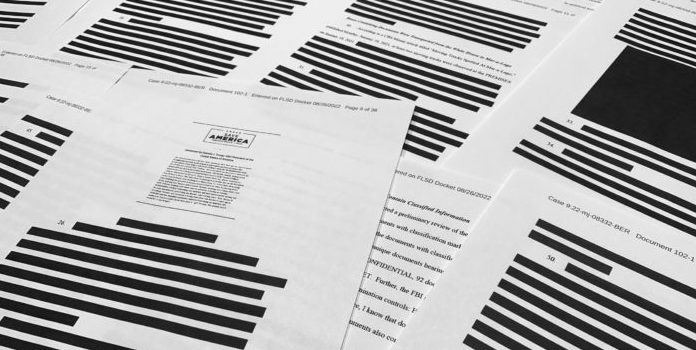(Headline USA) The heavily redacted affidavit from an FBI special agent that was cited as “probably cause” for the bureau’s controversial raid on former President Donald Trump’s Florida estate, Mar-a-Lago, did little to illuminate any actual evidence it had that Trump had committed a crime.
The FBI has come under sharp criticism for the raid—which even the biased magistrate who authorized it, Judge Bruce Reinhart, has acknowledged was an “unprecedented” step.
Reinhart, who was exposed for making derogatory attacks on Trump via his own social media, sought to defuse the public outrage by mandating that the Justice Department release the redacted version of the affidavit by noon on Friday.
However, the 32-page document is unlikely to placate critics, who still have many unanswered concerns and questions amid suspicions that the politicized law-enforcement agency is pressing its case to wage partisan lawfare against Trump that it can use as fodder in the upcoming 2022 and 2024 elections.
“The government is conducting a criminal investigation concerning the improper removal and storage of classified information in unauthorized spaces, as well as the unlawful concealment or removal of government records,” an FBI agent wrote on the first page of the affidavit in seeking a judge’s permission for a warrant to search the property.
It went on to claim that 14 of the 15 boxes recovered from Mar-a-Lago early this year contained documents with classification markings, including at the top secret level.
Trump has argued that as president he had the authority to declassify these at his discretion—and depending on the contents of those specific documents, may have publicly announced his intention to do so.
Rumors and speculation abound that the FBI may be seeking documents related to its own role in the Russia-collusion hoax, all of which Trump said he intended to declassify in the final days of his term.
The affidavit does not provide new details about the 11 sets of classified records recovered during the Aug. 8 search at Mar-a-Lago but instead concerns a separate batch of 15 boxes that the National Archives and Records Administration retrieved from the home in January.
In those boxes, according to the affidavit, officials located 184 documents bearing classification markings, including 25 documents marked as top secret. Agents who inspected the boxes found markings related to information provided by confidential human sources as well as information related to the Foreign Intelligence Surveillance Act.
In a separate document unsealed Friday, Justice Department officials explained that it was necessary to redact some information to “protect the safety and privacy of a significant number of civilian witnesses, in addition to law enforcement personnel, as well as to protect the integrity of the ongoing investigation.”
Documents previously made public show the FBI retrieved from the property 11 sets of classified documents, including information marked at the top secret level.
They also show that federal agents are investigating potential violations of three federal laws, including one that governs gathering, transmitting or losing defense information under the Espionage Act.
The other statutes address the concealment, mutilation or removal of records and the destruction, alteration or falsification of records in federal investigations.
None of the charges require that the FBI prove the classification status of the documents, despite its having used that as its probable cause for the raid.
It’s possible that the affidavit, particularly in its unredacted form, could shed light on key unanswered questions, including why sensitive presidential documents were transported to Mar-a-Lago after Trump left the White House and why Trump and his representatives did not supply the entire tranche of material to the National Archives and Records Administration despite repeated entreaties.
It could also offer additional details on the back-and-forth between Trump and the FBI, including a subpoena for documents that was issued last spring, as well as a June visit by FBI and Justice Department officials to assess how the materials were being stored.
In an acknowledgment of the extraordinary public interest in the investigation, Reinhart on Thursday ordered the department by Friday to make public a redacted version of the affidavit. The directive came hours after federal law enforcement officials submitted under seal the portions of the affidavit that they wanted to keep secret as their investigation moves forward.
In his order Thursday, Reinhart said the department had made compelling arguments to leave sealed broad swaths of the document that, if disclosed, would reveal grand jury information; the identities of witnesses and “uncharged parties”; and details about the investigation’s “strategy, direction, scope, sources and methods.”
But he also said he was satisfied “that the Government has met its burden of showing that its proposed redactions are narrowly tailored to serve the Government’s legitimate interest in the integrity of the ongoing investigation and are the least onerous alternative to sealing the entire Affidavit.”
Adapted from reporting by the Associated Press

